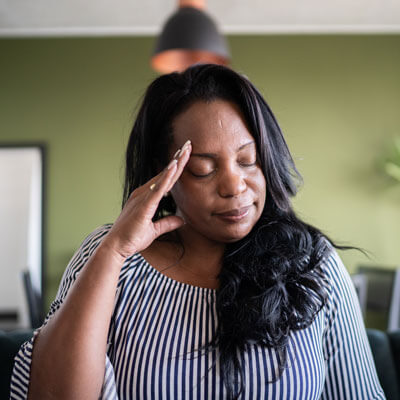 Dizziness is a general term for many different symptoms. While it generally means an abnormal sensation of motion, it can also mean imbalance, light-headedness, blacking out, staggering, disorientation, weakness and other sensations. Symptoms can range from mild and brief to severe spinning sensations, also known as vertigo.
Dizziness is a general term for many different symptoms. While it generally means an abnormal sensation of motion, it can also mean imbalance, light-headedness, blacking out, staggering, disorientation, weakness and other sensations. Symptoms can range from mild and brief to severe spinning sensations, also known as vertigo.
There are several factors that can cause balance and/or dizziness disturbances. Commonly, vertigo is associated with an inner ear problem, however sometimes finding the correct diagnosis can be difficult and frustrating.
Often an overlooked cause of dizziness is trigger points found in the anterior neck muscles, specifically the sternocleidomastoid muscle (SCM). Trigger points are described as hyperirritable nodules in fascia associated with taut bands of muscle fibers. Trigger points in the SCM have been shown to produce a variety of symptoms, including tearing of the eye, headaches, sinus congestion, ear and jaw pain, pain with swallowing and vertigo. It is very easy for this problem to be overlooked because problems with the SCM can be present without any associated neck pain. These are called latent trigger points which only produce pain upon manual examination/palpation. It takes a doctor or therapist who has been trained to look for these mechanical problems to detect them.
Where is the sternocleidomastoid muscle?
The sternocleidomastoid (SCM) muscles are the two large ropey muscles located at the front of the neck. They attach behind the ear (mastoid) and run down the front of the neck where they split into two heads. One head attaches to the collarbone (clavicle) and the other head attaches to the breastbone (sternum) at the base of the throat.
What movements does the sternocleidomastoid muscle control?
- Bends the neck and head forward, bringing chin to chest
- Bends the neck sideways, bringing ear to shoulder
- Turns the head side to side
- Stabilizes head when tilting chin upward or extending head backward
- Assists in chewing and swallowing
Causes of sternocleidomastoid pain
- Stress to the SCM: the pain is mostly caused by the stress over the sternocleidomastoid muscle due to activities like looking up for long periods of time.
- Poor posture and especially bad head postures can cause SCM pain. This poor ergonomics includes reading in bed, sleeping with too many pillows, having the head turned to the side or backside for long periods of time.
- Sudden pulls or injuries to head, like whiplash
- Breathing improperly can also lead to pain in the sternocleidomastoid.
- Acute or chronic infections, like flu or sinusitis
Treatment options for sternocleidomastoid dysfunction
1. Myofascial Release Therapy
This can be done by yourself or a trained professional. If doing it yourself, use your thumb and forefingers to squeeze the muscle gently or you can also opt for therapy by a professional. A doctor or therapist who specializes in active release technique will provide the best results for this condition.
2. Pain Relieving Gels
Sternocleidomastoid pain can be eased by several brands of rubs such as Biofreeze. It provides cooling and warm therapy to the muscle during the massage.
3. Corrective Actions
- Stand or sit straight while working: Posture is one of the biggest problems especially when one sits in front of the computer with the head projected forward. Instead one should stand or sit with the head erect.
- Do not overload the shoulder: If you are reading in bed, make sure the light is straight above your head pointing to the reading material and not on the sides. Holding a mobile phone with the shoulder can also cause SCM pain; therefore, earphones are recommended instead. Muscles can be overloaded by swimming due to turning the head sideways for breathing purposes.
- Keep the pillow in the right place: To help to prevent SCM issues, it’s better to sleep with a straight head and tuck the pillow ends in between the shoulders and chin. Make sure the pillow isn’t under the shoulders. Side-lying sleepers should keep a pillow in between shoulders and head while sleeping.
If you are experiencing dizziness and can’t seem to find a solution, have a qualified health professional test the muscles in the neck for imbalances.

Jul 25, 2024 at 1:54 PM
I am getting Botox and therapy for mine how long before the muscles will settle down
Aug 04, 2024 at 11:37 PM
I got this from chewing gum